From rodeos to radio, inside the Arizona fight against misinformation

PHOENIX — Tucked in the historically Latino east side of Phoenix, Ariz. is the broadcast studio of Radio Campesina. Founded by labor activist César Chávez in California, the station has broadcast across the West for 40 years.
Arizona listeners are drawn into the programming of regional Mexican cumbias, norteñas, rancheras and románticas. Their goal is to play uplifting and inspiring music driven by nostalgia for the relief brought after a long day of work.
But beyond the music, La Campesina also provides Spanish-language news. And during this election year it has a big goal: combat misinformation about elections among Arizona Latinos.
“César (Chávez) was very strong on ‘get out to vote,’” said Maria Barquin, program director of La Campesina, about the role of Latinos in elections. “For us, it’s our future. We need to show the audience the importance of that event and the value they have as a community.”
Latino voters in the swing state of Arizona are crucial to helping decide who will win the White House. Maricopa County, the swing county that includes Phoenix, is 30% Latino or Hispanic.

Yet Arizona is also a hotbed for conspiracies about elections and voting, and Latinos are among the demographic groups exposed to more misinformation this election cycle.
La Campesina pitches itself as nonpartisan, with listeners who vote for both Democrats and Republicans. It’s one of several groups that have been working for months in the lead up to Election Day to help combat the swirl of misinformation in the state.
“That division is being highlighted here. The pressures are being shown here. And we are a swing state,” said Tara Jackson, president of Arizona Town Hall, a nonpartisan group hosting town halls around the state on elections and voting. “So we just exemplify what’s happening nationally.”
A new radio series on the airwaves
Last year, La Campesina launched a campaign at a local rodeo to battle misinformation, and has since gone on to provide information on air, online and through videos about how and when to cast a ballot.
Barquin said starting at the rodeo was a way of uniquely targeting Latinos. Partnering with other organizations like the progressive voting group Mi Familia Vota, Barquin said they also bring water, food and voter information to construction crews across Phoenix or farmworkers in Yuma.
La Campesina has a monthly reach of over 7 million listeners on their radio airwaves and streaming. According to Neilsen, radio is the primary media platform for Latinos.

Throughout its campaign, La Campesina has debunked several rumors about voting and politics. Among them, Barquin said, were questions around trusting mail-in ballots, or the falsehood that if voters have bad credit, they can’t vote.
Listeners have also called in to ask about sharp political rhetoric, like when former President Donald Trump said immigrants were “poisoning the blood” of the nation.
“People get stressed about this, people get angry,” said Osvaldo Franko, producer and host at La Campesina, who helps with some of this real-time audience engagement. “That’s where we come in. We say, ‘Look, what he is saying is just a campaign slogan to attract followers, but obviously it’s meant to create division between people.’”
The radio network hopes to hold town halls and roundtables in the final weeks before the election. Barquin said the goal is to instill in their audiences that it is their responsibility to vote and be a part of the political process.
“It’s the whole accountability that we built in the audience, but also the uplifting and the value in their involvement in politics and elections,” Barquin said.
Barquin blamed Republicans, and primarily Trump, for the misinformation about elections and various policy issues.

“I think it’s coming from one side,” Barquin said. “The ones that want to see us as criminals, the ones that diminish the Latino community. That’s the side that is building all the lies against that Latino community because they want to build a negative narrative of what the Latino community brings to the table in this country.”
A new billboard on the skyline
Arizonans across the state looking to fight back misinformation about elections point to the 2020 election as the turning point.
“All you have to do really is go back to the 2020 presidential election and the role that Arizona played in that election,” said Jackson, from Arizona Town Hall. “Perhaps I might even add the role of that division in the Republican Party that you saw here in Arizona.”
Arizona, and specifically Maricopa County, became the center of election conspiracy theories after the state was called for President Biden in 2020. The false claims about voter fraud, machine voting problems and result manipulation have been largely promoted by Trump and other GOP leaders like Senate candidate Kari Lake — who also falsely denied her own gubernatorial loss in 2022.

The results have been serious. Thousands gathered in 2020 to protest the election results. Since then, Republican officials and their families have been threatened and there have been wider security concerns around not just elections but the physical act of voting in Arizona.
Out of this, a group of Arizona conservatives launched a new nonprofit called Conservative Agenda for Arizona. Backed by national organizations R Street and The Agora Foundation, and with a board of more than a dozen current and former GOP leaders, the group was created to be a “conservative voice and space” in building trust in the voting process.
“I’ve always been a registered Republican, but I found that some of the positions — or all of the positions that were taken on election denialism — were something that I couldn’t align myself with,” said executive director Jane Andersen. “We are uniquely positioned to reach out to our conservative groups. We are uniquely positioned to offer an alternative that people can hold on to, and that actually does feel really comfortable.”
The group stood up an electronic billboard, visible from the freeway, with the words, “Thank you election workers” and the organization’s logo. The message aims to counter false conspiracies that election and poll workers might manipulate election results.
“This election cycle [the poll workers] are going to be … veterans, a lot of our neighbors, a lot of them are your friends. So this idea that we’re going to villainize them based on politics is just wrong,” said Matt Kenney, another cofounder of the nonprofit.

He hopes their organization can also show that not all Republicans believe false claims of a stolen election, or are looking to act violently.
“We’ve used this as an opportunity to bring together your big tent Republicans, your big tent conservatives who want to see confidence restored in the election system and back in democracy,” Kenney said. “This sort of distrust and lack of confidence only hurts my party long term.”
Ailsa Chang, Noah Caldwell and William Troop contributed to this report.
Transcript:
AILSA CHANG, HOST:
If you spin your radio dial to 101.9 FM, you will hear something like this.
(SOUNDBITE OF ARCHIVED RECORDING)
UNIDENTIFIED PERSON #1: (Speaking Spanish).
CHANG: Radio Campesina is a Spanish-language radio network founded by the labor and civil rights activist Cesar Chavez back in 1983. It reaches 7.5 million people a month in Arizona, California, Nevada and Georgia.
(SOUNDBITE OF ARCHIVED RECORDING)
UNIDENTIFIED PEOPLE: (Speaking Spanish).
CHANG: La Campesina has gotten so big among Latinos, even President Biden appeared for an interview last November with host Tony Arias.
(SOUNDBITE OF RADIO SHOW, “LOS CHAVORRUCOS”)
TONY ARIAS: (Speaking Spanish).
PRESIDENT JOE BIDEN: Well, invite me back. I’m like a poor relative. I show up…
CHANG: Well, this year, Radio Campesina has a new focus. It’s launched a campaign to fight false information about the 2024 election. After Biden narrowly won this state four years ago, Arizona became a true battleground state. And because a quarter of all eligible voters here are Latino, they have become a target for lies, half-truths, confusion, as everyone competes for their vote.
(SOUNDBITE OF ARCHIVED RECORDING)
UNIDENTIFIED MUSICAL GROUP: (Singing in Spanish).
UNIDENTIFIED PERSON #2: (Speaking Spanish).
CHANG: On one of La Campesina’s most popular shows, “Punto De Vista,” longtime host Osvaldo Franco urges listeners not to share social media posts without first checking whether they’re true. He brings in guests who talk about the voting process to share accurate information. And he takes questions from the audience, like from this man, who wants to know – whatever happened to immigration reform?
(SOUNDBITE OF RADIO SHOW, “PUNTO DE VISTA”)
UNIDENTIFIED PERSON #3: (Speaking Spanish).
CHANG: Right after a recent show, we catch Franco in his office next to the studio, and we ask him what nonsense out there is nagging in the minds of his listeners. And he recalls a moment after former President Trump made a provocative statement that illegal immigrants are, quote, “poisoning the blood of the country.”
OSVALDO FRANCO: (Through interpreter) So some people were asking us, what does that mean? Is he saying we have a blood infection? Like, some people thought, am I going to get injected with something? Is that what that means? And then there were other people who just thought what Trump said is racist. So that’s where we come in. We say, look, it’s just a campaign slogan, but obviously it’s meant to divide people.
CHANG: The headquarters of Radio Campesina are right here in Phoenix, where Maria Barquin is the program director.
(SOUNDBITE OF DOOR SHUTTING)
MARIA BARQUIN: Maria Barquin – welcome.
CHANG: Hi – Ailsa Chang. It’s so nice to meet you.
Across from her desk is this enormous portrait of Cesar Chavez scratching his chin while deep in thought.
BARQUIN: If he’s thinking, I better be thinking. Every day that I’m like, OK, what do I do on this decision? I just look up.
CHANG: Yeah.
BARQUIN: And I’m like, OK.
CHANG: Do you scratch your chin like that when…
BARQUIN: Oh, my goodness…
CHANG: …You’re thinking?
BARQUIN: …Every day.
CHANG: (Laughter).
BARQUIN: Every day. But I look at him and…
CHANG: For Barquin, this is more than just some job. Radio Campesina is a community started by Latinos, managed by Latinos to serve Latinos. She says building and maintaining trust with listeners is crucial. And the key to that trust is making sure their listeners are getting the truth.
BARQUIN: There is a new pandemic that is called disinformation and misinformation, and it’s spreading out, especially on social media. And there’s not a lot of resources in Spanish to fact-check what’s going on.
CHANG: Barquin says she notices patterns in the kinds of false information that listeners have questions about. Like, does bad credit make you ineligible to vote? Or can mail-in voting ever be trusted?
BARQUIN: And I said, why can you not trust a regular mail with your ballot when you trust that institution when you request your medication?
CHANG: So tell us about how you teach listeners to spot false information.
BARQUIN: There’s a Latino feeling you got. When you see this is too good to be true, come on, question it. Don’t share it because you become part of the problem by reposting it. Keep digging. Keep digging. Keep digging. Call the people that you feel you can trust. But again, if you feel like it’s too good to be true…
(SOUNDBITE OF FINGER SNAPPING)
BARQUIN: …That’s your first sign.
CHANG: Is there any way for you to know whether your efforts are working to combat false information?
BARQUIN: Well, I think people are questioning things more, and you can feel it. Because when they call in on our shows, they’re like, hold on, but I checked this and this and that. So they explain the process. They’re questioning things.
CHANG: Barquin first arrived in Arizona from Mexicali, Mexico, 33 years ago without documents. She wanted a job in radio. And to her surprise, Radio Campesina gave her one as a weekend DJ. And she says that memory forever connects her to their audience.
BARQUIN: It means a lot to me because I’m one of them. I’m a listener. I’m an immigrant. So I relate to their story a lot because I came from there. And every time that I have someone that comes into the office to ask for an opportunity to be part of the organization, I go back to that moment when I was first hired. I go back to that time when I got here. And I’m like, I need to make sure I give that to the audience. (Crying) Oh, God.
CHANG: Thank you for being so heartfelt and candid, Maria.
BARQUIN: (Crying) I have never cried like this.
CHANG: At the end of the day, Barquin says she wants Radio Campesina to be a destination on the dial that uplifts its listeners after their long days as construction workers, restaurant workers, landscapers – people with real voting power in this state now.
But, you know, Radio Campesina is just one group noticing the increase of election misinformation and disinformation out there. For the last few years, it’s been a wider concern for Arizonans all around the state, and that is something that NPR’s Ximena Bustillo has been looking into as she’s been on the ground with us. Hey, Ximena.
XIMENA BUSTILLO, BYLINE: Hey, Ailsa.
CHANG: So how are other organizations reaching people in Arizona to talk about these issues?
BUSTILLO: There’s a nonpartisan group called the Arizona Town Hall. They’ve been around since 1962, with the goal of promoting community-led discussions. They pick a big topic two years in advance and then spend the year hosting town halls across the state. This year, the topic was elections and voting. The group has hosted over 23 discussions, some attracting as many as a thousand people.
CHANG: Wow. Well, what have they heard in these sessions?
BUSTILLO: Tara Jackson, president of the Arizona Town Hall, said that, in sessions, people confess that they might not know all their voting rights, and they argue over whether or not mail-in voting is safe or if democracy is good at all.
TARA JACKSON: There was much more of a polarized response to these questions than we would normally have in discussions with our organization.
BUSTILLO: Jackson pinpoints the 2020 election as the start of a lot of this distrust. Arizona, and specifically Maricopa County, where Phoenix is, really became the center of election conspiracy theories after the state was called for Biden in 2020. The false claims about voter fraud, machine voting problems, manipulated results – these all have been largely promoted by former President Donald Trump and other GOP leaders.
CHANG: OK, well, it seems like a lot of these allegations are coming from the right – like, from Republicans, right? So I’m curious – what have you heard from people who identify as conservative?
BUSTILLO: I spoke with a new nonprofit called the Conservative Agenda for Arizona. It includes over a dozen current and former GOP elected officials, party leaders and everyday Arizonans. Here’s Matt Kenney, one of the founders.
MATT KENNEY: We’ve used this as an opportunity to bring together your Big Ten conservatives who want to see confidence restored in the election system and back in democracy.
BUSTILLO: He says distrust in elections hurts his party in the long term, and having a conservative-led group was important to garner support. The group estimates that it has over a thousand members and hopes to bring in more with events.
CHANG: And what kinds of false information are they looking to push back against?
BUSTILLO: Well, we went to visit a big billboard that they have running along the freeway that says, thank you, election workers. This is in response to false conspiracies from the right that election workers are manipulating ballots or the vote-counting process. Here’s Jane Andersen, another co-founder.
JANE ANDERSEN: Let’s give people an opportunity to say yes, I absolutely support my poll worker. I am a conservative, and I support our election officials. We want to make sure that that narrative is amplified.
BUSTILLO: Kenney and Andersen hope to remind Arizonans that election workers are the veterans, neighbors and family in their community. And they say that this is a way to push back against the stereotypes about Republicans in Arizona, as they say not all Republicans believe the election was stolen.
CHANG: That is NPR’s Ximena Bustillo, who’s been on the ground with us in Arizona for our series, We, The Voters. Thank you so much, Ximena.
BUSTILLO: Thank you.
A housemaid is suspected of killing a child in ‘Clean,’ a novel about class and power
Chilean author Alia Trabucco Zerán has written an intense novel about the kind of deep down rot that lingers, despite the most vigorous scrubbing.
Who was Hamas leader Yahya Sinwar?
Yahya Sinwar is widely considered to have been the masterminded behind Hamas’ cross-border assault on Israel a year ago.
WBHM welcomes ‘The Lost Child’ to Saturday evening lineup
The Lost Child introduces listeners to an array of roots music from blues to bluegrass and beyond. For more on the show, WBHM’s Richard Banks sat down with the show’s host Burgin Mathews.
Israel is investigating whether it killed Hamas leader Yahya Sinwar in Gaza
The Israeli military says three militants were killed in an operation in Gaza and intelligence agents are examining whether Hamas leader Yahya Sinwar was one of them.
The flu shot is different this year, thanks to COVID
A strain of influenza appears to have disappeared from the planet since COVID. As a result, U.S. flu vaccines have been redesigned.
China ends international adoption. Reactions range from shock to relief
The decision has sent shockwaves through the adoption community and angered families still in the process of adopting children from China. We interviewed adoptees in the U.S. to hear their reaction.






